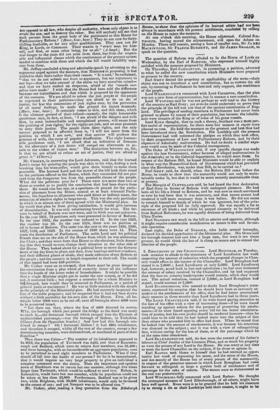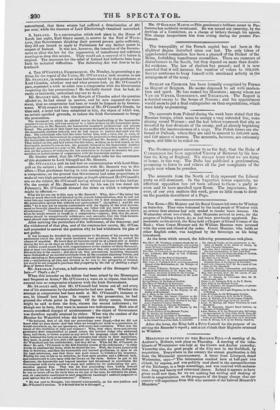2. EMOLUMENTS OP THE CuAncnr.r.ort. Lord BROUGHAM, on Tuesday, took
occasion to allude to the statement of Lord Lyndhurst last week respecting the amount of reduction which the proposed changes in Chan- cery would effect in the income of the Chancellor. Lord Brougham had stated it as 7,0001.; Lord Lyndhurst at only 2,500/. Lord Lyndhurst had, however, erred both in fact and calculation ; he had over estimated the amount of salary received by the Chancellor, and he had supposed that the fees on country bankruptcies would remain, which they would not. The actual reduction, instead of 7,0001., as Lord Brougham had stated, would amount to 7,500/.
Lord ELLENBOROUGH, who seemed to doubt Lord Brougham's state- ment, expressed his surprise that he should have been so curiously at- tentive to the emoluments of his office, that he had better ascertained their amount in three months than Lord Lyndhurst had in three years.
The LORD CHANCELLOR said, if he were found paying attention to the fees of his office with a view of increasing them—if he were found standing up against reform for the purpose of preserving his emolu- ments—if he were found opposing every bill for the better administra- tion of justice, lest his own profits should be rendered insecure—then he could bear to be told that he had looked more into the subject of fees than others who preceded him in office had done. When he stated that he looked into the amount of emoluments, it was because his attention was directed to the subject ; and it was with a view of relinquishing fees, without caring for the loss of them, or of the patronage which he at the same time abandoned.
Lord ELLENBOROUGH said, his fees were the reward of his father's labours as Chief Justice of the Common Pleas, and as much his property as were the estates of any Lord in the House. He was ready at any time to meet the Lord Chancellor on the subject, if he chose to agitate it.
Earl RADNOR took blame to himself that he had omitted an oppor. tunity last week of expressing his sense, and the sense of the House, and not merely of the House but of every person of the community, in respect of the generous manner in which Lord Brougham had come forward to relinquish so large a portion both of emolument and of patronage for the sake of reform. The means were as disinterested as the end was praiseworthy. Lord WINCHILSEA fully concurred with Lord Radnor. He thought the attempted sarcasm of Lord Ellenborough, of all others, might have been well spared. Even were it to be granted that he held his sinecure by as strong a tie as their Lordships held their estates, it ought to be
• remembered, that those estates had suffered a deterioration of 40/. per cent:, while the sinecure of Lord Ellenborough remained untouched.
3. IRELAND. In a conversation which took place in the House of Lords last night, Earl GREY stated, in answer to the Earl of Wick- Low, that Government thinking their present powers quite sufficient, they did not intend to apply to Parliament for any farther power in respect of Ireland. It was not however, the intention of the Govern- ment to allow the law for the suppression of tumultuous and seditious meetings to drop this session. They would ask a renewal of it before it expired. The measures for the relief of Ireland had hitherto been kept back by technical difficulties. The Subletting Act was first to be in-
t roduced.
4. THE O'CoNWELL COMPROMISE. On Monday, in presenting a pe- tition for the repeal of the Union, Mr. O'CoxxEnn took occasion to ask Mr. STANLEY, in reference to what had been stated by that gentleman to Lord Chandos, whether any and what persons had, on Mr. O'Connell's part, expressed a wish to enter into a compromise with the Government respecting the late prosecutions ? He decidedly denied that he had, di- rectly or indirectly, authorized any one to do so. Mr. STANLEY said, when the Marquis of Chandos asked the question alluded to, he had stated in answer, and he now repeated the state- ment, that no compromise had been or would be listened to by Govern- ment. With respect to the interposition of Mr. O'Connell's friends, he then said, a letter had been submitted to hire, the object of which was, on certain specified grounds, to induce the Irish Government to forego the prosecution.
The document to which he alluded was In the handwriting of the honourable member's son-in-law, and was enclosed In a letter written by the honourable mem- 'bees own son, to Mr. Bennett, the honourable member's professional and private 'friend. The purport of that letter was moreover declared to him to be dictated by the honourable member himself, and he had reason to believe that such was the fact. The individuals who laid this letter before him, with a view, but in vain, of Inducing the Irish Government to compromise the prosecution then pending against the honourable member, were the Earl of Gleneall and Mr. Bennett. (Hear, hear!) They waited on him, and laid before him this letter, written, as he had stated, by the honourable member's son-in-law, the purport dictated by the honourable member himself, and enclosed in a note to Mr. Bennett from the honourable member's own son, for the purpose of inducing the law authorities in Ireland to abandon the pro- Secution on certain terms of compromise with the honourable member.
Mr. Stanley added, that Mr. O'Connell might refer for the correctness of this statement to Lord Glengall and Mr. Bennett.
Mr. O'CONNELL said he had had no communication with Lord Glen- gall on the subject ; hid communication with Mr. Bennett was to this effect.—That gentleman having in vain attempted to persuade him into a compromise, on the ground that Government had some propositions to make of very high personal advantage, at length addressed Mr.0' Connell's son on the subject, Mr. O'Connell having refused to listen to him farther. On the receipt of Mr. Bennett's letter by his son (it was dated fith February), Mr. O'Connell dictated the terms on which a compromise might be effected.— What did his son say in this note to Mr. Bennett? Why, this—" My father has been so much deceived and deluded by the present Administration, that he will not enter into any negotiation with any of its members till it first consents to abandon the prosecution against him without any equivocation." (Laughter.) And his son adds, "As it may not be exactly conformable with the dignity of the Irish Govern- ment to formally abandon the prosecution, my father will not insist on a formal abandonment." (Continued laughter.) His son then specified the terms on which alone he would consent (a laugh) to a compromise,—namely, first, that the prose- cution should be unequivocally withdrawn, and, secondly, that the Irish Govern- ment should state what measures of relief were intended towards Ireland.
After noticing the particulars of the indictment, of the demurrer, and the withdrawal of that plea, and of the common-law courts, Mr. O'Con- nell proceeded to answer the question why he had withdrawn his plea of not guilty.
It was because he dreaded the consequences to the peace of his country by the excltenient which the trial would inevitably have produced, that he waived his chance of acquittal. He knew that all business would be at a stand-still in Dublin during the five or six days on which the trial would last .; he knew that the trades a Dublin would escort him with craped banners to the number of thirty thousand; that at least two thousand respectable inhabitants of that city would have attended 'himeach:day to the courts' and above all, that processions, including thousands upon thousands of an excited multitude from all the counties adjoining Dublin, and even extending to Roscommon and Cavan, would fill the streets, anxious of the re- sult ;—and knowing all this, and devoted as he was to the prosperity of Ireland, yet would he not consent to purchase that prosperity by the risk of shedding a single drop of human Mood! Mr. ABRAHAM JAcoBs, a half-crown member of the Strangers' Gal- lery—" That's a lie !"
'When this intruder on the debate had been seized by the Messengers and Sergeant at Arms,* Mr. O'CoNxxnn went on to repeat, that he had entered into no compromise whatever with the Irish Government. Mr. STANLEY said, that Mr. O'Connell had borne out all and every one of his statements by the admissions he had now made. Whether the attempt at compromise had been made at Mr. O'Connell's instance or not, he himself best knew. In respect to the prosecution, he had granted the whole point in dispute. Of the thirty counts, fourteen might be said to form the first, sixteen the second indictment ; for though one in form they were in essence two indictments. Both sets of counts contained charges of misdemeanour : the object of Government was therefore equally attained by either. What was the conduct of the Alember for Waterford when the indictment was laid ?
"He declared, Brat of all, that our proceedings were illegal,--that we did not know what we were about—and that when we brought our work to a conclusion, he would overwhelm us, for our ignorance, with scorn and confusion. What was the result of this ebullition of folly and violence 1 Why, that when three-and-twenty gentlemen were empannelled as grand jurors, the learned Judge who addressed them, told them, in terms as plain as any which the language could afford, that if they believed the facts to be such as the witnesses had sworn in their depositions, they must, in point of law, find a bill against the honourable and learned Member for Waterford and his confederates; and they did so. What did Mr. O'Connell do then? He said, 'I'll demur to the first fourteen counts of the indictment;' in other words, he admitted the facts, while he denied the law. Well, the Crown joined with Lim in demurrer, and then the honourable and learned gentleman, in spite of all Lis legal astuteness, saw that there was good reason to withdraw his demurrer. Finding his case in la's to be defective, he went upon another and a different tack, and endeavoured to join issue with the Crown on the facts. Before he put in his aemurrer, the honourable and learned member had threatened to overwhelm the Government with every species of scorn and raillery for its undertaking the pro- secution against him. That was his first proceeding: then finding himself mistaken in his law, he wished to try his fortune on his facts; and then, finding that be was no better off on the facts than on the law of the case, he withdrew his pleas, and, oh lamentable conclusion to such magnificent vauntings I suffered judgment to pass against him for a misdemeanour." (Cheers.)
• He was sent to Newgate, but released subsequently, on his own petition and 311t, O'Connell's motion. It is Muted that he is deranged...;, Mn. CI`Gortmor Marro.—This gentleman's brilliant career in Par- liamenthas suddenly terminated. He was turned out yesterday, by the decision of a Committee, on a charge of bribery through his agents. The charge incapacitates him from sitting during the present Par- lieanent.



























 Previous page
Previous page